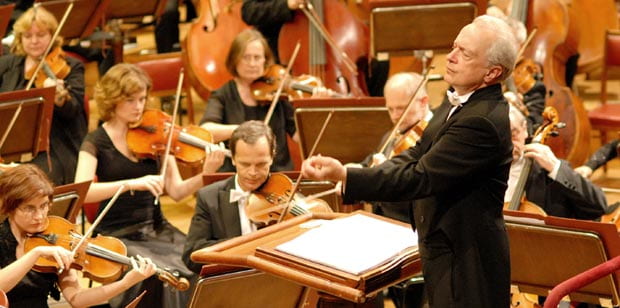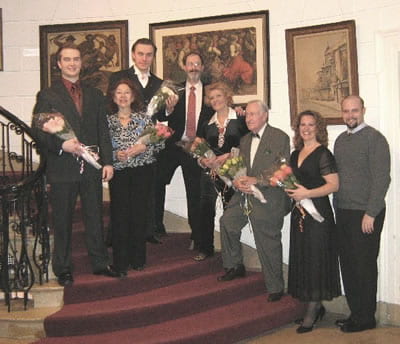Polish Music Reference Center Newsletter Vol. 14, no. 4
In Memoriam
DR. STEFAN P. WILK, M.D.
 With great sadness we note the recent passing of Dr. Stefan P. Wilk, a prominent member of Polish community in Los Angeles, a distinguished physician, humanitarian, and philanthropist. He died on 25 March 2008 in Los Angeles after a long illness.
With great sadness we note the recent passing of Dr. Stefan P. Wilk, a prominent member of Polish community in Los Angeles, a distinguished physician, humanitarian, and philanthropist. He died on 25 March 2008 in Los Angeles after a long illness.
Stefan Wilk was born in 1917 near the city of Lwów in southeastern Poland. Orphaned early in life, he was raised in several foster homes and, between the years 1931-1935 he studied at the Niepokalanów Seminary, an institution founded by the legendary Father Maximilian Kolbe, who was later canonized by Pope John Paul II. Dr. Wilk eventually returned to the city of Lwów, where he worked as private tutor and self-financed his studies. He obtained his high school diploma and enrolled in the Lwów Polytechnical Institute, concentrating in mathematics and engineering, but his education was interrupted by the outbreak of World War II.
In the early months of the war, Stefan Wilk escaped from occupied Poland to Yugoslavia and with other Polish refugees, made his way to France, where he joined a Polish Army battalion attached to the French Army. Fluent in French, German and Russian, he also served as a military interpreter. When the French capitulated to Hitler’s June 1940 invasion, Stefan Wilk’s unit retreated to neutral Switzerland, where he was interned for the duration of the war.
The plight of Polish soldiers in Switzerland was known to Ignacy Jan Paderewski, himself a resident of Switzerland, who became a refugee in the United States in late 1940. By appealing to Henry Noble MacCracken, President of the Kosciuszko Foundation in New York, Paderewski secured funds for the 450 Polish soldiers interned in Switzerland, enabling them to continue their studies.
Along with his fellow soldiers, Stefan Wilk was able to study medicine first at the internment camp in Winterthur and later at the School of Medicine at the University of Zurich, graduating with a medical degree on January 29, 1949. Afterwards, he enrolled in an advanced degree program in the field of biochemistry, eventually receiving his diploma and further specializing in radiology at the University of Bern.
Dr. Wilk arrived in the United States in 1952. He settled in Los Angeles, where he obtained a medical license and a Radiology Board Certification. He joined the UCLA School of Medicine in 1954 as an Assistant Professor. Then, in 1959 he became Director of Radiology Department at the Queen of Angels Hospital, one of the most important teaching hospitals in the region, where he also started a school of x-ray technology, the first of its kind in Los Angeles.
Dr. Wilk’s wide-ranging education and expertise led him to initiate many programs in the various hospitals and learning institutions that he had graced with his knowledgeable presence. Author of a pioneering work in tomography and image diagnostics, Dr. Wilk also translated several key books on radiology from German into English, including The Human Spine in Health and Disease (1959) andBorderlands of the Normal and Early Pathologic in Skeletal Roentgenology (Third American Edition, 1968), the latter considered a key text in the field of radiology for several decades. Author of numerous scientific papers and articles, Dr. Wilk was widely recognized as a leading specialist in the field of radiology throughout the United States and some of his early research on tomography helped lay the groundwork for the development of CAT scan technology. During the 1970s Dr. Wilk obtained his amateur radio license and conducted some of the first transmittals of x-rays via television. Dr. Wilk was the recipient of many awards, including the 1962 Special Award from the Radiological Society of North America, the 1978 Doctor of the Year Award from the Queen of Angels Hospital, the 1983 Distinguished Service Award from Santa Marta Hospital, and the 1986 Regina Angelorum Award.
Dr. Wilk’s other important contribution in the field of medicine is Children’s Medical Care Foundation, which he endowed and chaired for many years since its inception in 1981. The Foundation is based on providing the most promising young Polish pediatric physicians with funds for a specific period of practical training at the world’s leading medical schools. Over the past two decades, the Foundation’s scholars received training at such prestigious medical schools in the United States as the University of Southern California, Harvard Medical School, and Columbia School of Medicine, as well as universities and medical schools in Paris, Frankfurt and Zurich. Dr. Wilk’s Children’s Medical Care Foundation also helps sustain pediatric hospitals in Poland and the Ukraine. Dr. Wilk’s exemplary charitable efforts on behalf of children’s health have been recognized by the Polish government in 1990 with a Cross of Polonia Restituta, one of the highest honors that can be bestowed by Polish government on a civilian, soldier, or a foreigner.
In 1952, Dr. Stefan Wilk married Wanda Harasimowicz, a Detroit native who moved with her parents to California in 1949. During their many years together, the Wilks’ love of Polish music led them to establish and endow numerous organizations that promoted Polish culture. Together with his wife, Dr. Wilk was the founder of the Polish Music Reference Center (now called the Polish Music Center) at the University of Southern California in 1985. The Wilk endowment provides for the operation of the Center’s staff and their generous support over the past twenty years has led to countless concerts, book publishing, creation of the PMC website, and establishing of a unique library of manuscripts, scores and books relating to Polish musical culture. Ars Musica Poloniae, another charitable foundation established in 1992 by the Wilks, facilitates a variety of projects in Polish music from publishing and recording to scholarships for Polish students in Los Angeles.
Due to his unprecedented philanthropy and promotion of Polish music, Dr. Wilk received the Directors’ Award from the USC School of Music in 1983. Together with his wife, he also received the Gold Medal from the Polish Composers’ Union in 1988 and the Polonia Award from the Polish American Congress in 1989. Dr. Wilk also received an Honorary Doctorate from the University of Warsaw in 1990 for his outstanding scientific, educational, and humanitarian achievements.
Throughout his long and productive life, Dr. Wilk’s guiding principle was to help others, just as he was helped by numerous individuals and institutions during his early years in Poland and Switzerland. A brilliant intellectual, scientist, medical pioneer, and ambassador for Polish culture in the United States, he was instrumental in transforming and enriching the lives of many people, earning the respect and gratitude of society for his far-reaching generosity and good will.
Dr. Stefan P. Wilk is survived by his wife, Wanda, daughter Diane Wilk Burch and her spouse, Michael Burch, grandchildren, James, Katherine, and Richard Burch, as well as Dr. Kenneth A. Harris—a nephew whom Dr. Wilk helped to raise—his wife Terri, and children, Michael, Bryan and Kimberly. Visiting hours are on Friday, April 4, 2008 from 9 a.m. to 9 p.m. at the Forest Lawn, Hollywood Hills. Funeral services for Dr. Wilk will be held on Saturday, April 5, 2008 at 1 p.m., at Our Lady of the Bright Mount Church, 3424 West Adams Boulevard, Los Angeles. Burial will be at Forest Lawn Hollywood Hills immediately following the service.
News
Szpakiewicz Wins Immigration Battle
 LOS ANGELES, CA. March 13, 2008: It is an exceptional story of determination and triumph to emerge from the onslaught of cynical reports on America’s immigration crisis. Polish-born cellist and University of Southern California instructor Marek Szpakiewiczhas won his fight to stay and perform in the United States, after a long struggle to prove himself to a faceless bureaucracy.
LOS ANGELES, CA. March 13, 2008: It is an exceptional story of determination and triumph to emerge from the onslaught of cynical reports on America’s immigration crisis. Polish-born cellist and University of Southern California instructor Marek Szpakiewiczhas won his fight to stay and perform in the United States, after a long struggle to prove himself to a faceless bureaucracy.
On March 6, rallied on by his Japanese-born wife and such luminaries as cellist Yo-Yo Ma, legendary vocalist Bobby McFerrin, Pulitzer Prize-winning composer John Corigliano, and Oscar-winning film composer Jan A.P. Kaczmarek, the cellist finally earned permanent residency from the U.S. government as an “Extraordinary Ability Artist.” The title means he has “sustained national or international acclaim and [his] achievements have been recognized” in his field, according to the U.S. Citizenship and Immigration Services (USCIS).
Twelve lawyers had refused to take his complex case, believing the cellist had little to no chance of winning. Szpakiewicz applied for a petition to become a U.S. permanent resident in September 2005, compiling a 4-inch-thick portfolio of supporting documents and 32 letters of recommendation from renowned musicians. His wife Keiko Mori carefully prepared the petition with assistance from an immigration lawyer.
Other talented immigrants have not been so lucky. In December 2005 and February 2006, Washington Post reporter Bob Thompson wrote about celebrated Chinese writer Yiyun Li, a Random House author and alum of New Yorker Magazine and Paris Review, who lost her immigration case because her submission did not prove she was “one of that small percentage who have risen to the very top of the field of endeavor.” In the Szpakiewicz case, the USCIS approved his petition in only five months in February 2006, after almost two years of preparation.
After the approval of the petition, however, the couple had to wait more than two years for his permanent resident status because of an FBI background check strengthened after the terrorist attacks of Sept. 11, 2001. Although 99 percent of FBI background checks are completed within six months, nearly 320,000 people were waiting for theirs as of August 2007. That number included more than 61,000 who had been waiting for more than two years– the group Szpakiewicz fell into.
Szpakiewicz and his wife sued USCIS, Homeland Security, and other government agencies in July 2007, joining more than 4,100 lawsuits filed against U.S. immigration in fiscal year 2007. The suit asked a federal judge to force immigration officials to adjudicate the case. Despite their efforts, the defendants could not meet the government deadlines, which resulted in an extension of seven months, instead of the initial agreement of 60 days. Before the final court hearing date, however, the USCIS decided to grant Szpakiewicz permanent residency on March 6.
Warsaw Premiere Of Meditation Und Psalm
The National Philharmonic Chorus and Orchestra gave the first Warsaw performance of Meditation und Psalm by Polish composer Piotr Moss on March 28 and 29 with the Philharmonic’s artistic director, Antoni Wit, conducting. Originally written for the centennial anniversary of the Berlin Union of Singers [Berliner Sängerbund], the work was first performed with 700 choristers singing with the Szczecin Philharmonic Orchestra under the direction of Eugeniusz Kus at the Berlin Philharmonic on September 21, 2001, only ten days following the tragic destruction of the World Trade Center in New York City.
Indeed, the introspective setting of the Agnus Dei and the lament of the verses taken from Psalm 130 De profundis, the Latin texts upon which the work is based, form a masterful threnody by the composer.
Seldom played in Warsaw, the music of Piotr Moss was stunningly performed by both the chorus and orchestra. Conductor Antoni Wit gave a thrilling interpretation underlining the composition’s humanistic message, along with its expression of anxiety, symbolic of the angst found in today’s civilization. Moss’ work began the concert which was shared with Bartók’s Third Piano Concerto (brilliantly played by pianist Dezsö Ránki) and, following intermission, three works for chorus and orchestra by Brahms: Nänie, Gesang der Parzen and Schlicksalslied, all three which Wit conducted from memory.
Meditation und Psalm will once more be heard this year on July 11 at the Cathedral in Koszalin. One can only hope that the music of Piotr Moss will find a more frequent place in the repertoire of Polish philharmonic orchestras and choirs. Next year, 2009, marks the 60th anniversary of the composer’s birthday as well as the 40th anniversary of his artistic life. These anniversaries provide the perfect occasion to rectify the situation of his music being played more often in France and Germany than in his native land.
[JH]
Bydgoszcz Opera Festival
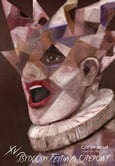 2008 marks the 15th anniversary of the Bydgoszcz Opera Festival. The Festival is hosted by Opera NOVA, one of the most modern and versatile music theatres in Poland. Since 1994, the Bydgoszcz Opera Festival has been an important venue for annual meetings of music theatres, where they present their best productions. The broadly understood program of the Festival provides for the staging of operas, operettas, ballets and musicals. Every year the Festival plays host to at least one distinguished foreign company. This year is no exception, as the Festival is bringing in the National Korean Ballet Company from Seoul and the St. Petersburg Chamber Opera.
2008 marks the 15th anniversary of the Bydgoszcz Opera Festival. The Festival is hosted by Opera NOVA, one of the most modern and versatile music theatres in Poland. Since 1994, the Bydgoszcz Opera Festival has been an important venue for annual meetings of music theatres, where they present their best productions. The broadly understood program of the Festival provides for the staging of operas, operettas, ballets and musicals. Every year the Festival plays host to at least one distinguished foreign company. This year is no exception, as the Festival is bringing in the National Korean Ballet Company from Seoul and the St. Petersburg Chamber Opera.
Baird Competition Update
The 1st round of the 49th edition of the Baird Young Composer’s Competition is over. The jury consisting of Maciej Małecki (chairman), Zbigniew Bargielski (secretary), Anna Sikorzak-Olek, Stefan Kamasa, Jan Oleszkowicz and Mariusz Pędziałek has chosen the pieces to be performed at the 2nd round concert on June 19, 2008. The pieces chosen are:
- Turmalin for harp solo (emblem Meymun)
- e-motion: e- mission: e-vaporation for viola solo (emblem Emunctus-1)
- Frazy [Phrases] for oboe solo (emblem asdx81)
- Drei Formen [Three Forms] for viola (emblem Askret)
- Sonata in g for oboe (emblem Logos)
- Trzy spojrzenia na muzykę [Three views/glances of the music] for oboe (emblem Spojrzenie)
The winners will be chosen after the concert on June 19, 2008 in the Józef Elsner Auditorium in the Dziekanka dormitory in Warsaw.
[From: www.zkp.org.pl]
Polish Year In Israel
 The “Polish Year in Israel – 2008/2009” is an initiative of the Polish Ministry of Culture and National Heritage and the Ministry of Foreign Affairs. Its aim is to bring the Polish and Israeli societies closer by strengthening mutual contacts and initiating long-term cooperation between institutions of the two counties. The program of the Polish Year includes several dozen cultural and science-related events, as well as economic, political and tourist events. The cultural program covers screenings of films, theatre and dance performances, as well as events in clubs, galleries, museums, concert halls and public areas all over Israel.
The “Polish Year in Israel – 2008/2009” is an initiative of the Polish Ministry of Culture and National Heritage and the Ministry of Foreign Affairs. Its aim is to bring the Polish and Israeli societies closer by strengthening mutual contacts and initiating long-term cooperation between institutions of the two counties. The program of the Polish Year includes several dozen cultural and science-related events, as well as economic, political and tourist events. The cultural program covers screenings of films, theatre and dance performances, as well as events in clubs, galleries, museums, concert halls and public areas all over Israel.
The premiere of Madama Butterfly, April 9th at the Israeli Opera, directed by the acclaimed Polish artist Mariusz Treliński, will mark the opening of the year. Other music events in April include a Chopin evening in Rishon Lezion: Camerata Silesia and Maria Pomianowska on April 9th and 10th, and concerts of the band Kwadrofonik and the Lutosławski Piano Duo on April 11th and 12th.
The coordinator of the Polish year in Israel is the governmental organization – Adam Mickiewicz Institute (www.iam.pl). The Institute’s activities are an element of a strategy to promote Poland internationally. The Polish Institute and the Polish Embassy in Israel are partners in this project.
Additional information is available at: www.poland-israel.org.
[From: www.polishinstitute.org.il]
New Sinfonia Varsovia Director
The French conductor, Marc Minkowski, was appointed the new music director of the Sinfonia Varsovia Orchestra. The official documents were signed by Janusz Marynowski – Administrative Director of the orchestra; Marc Minkowski – newly appointed Music Director; Krzysztof Penderecki – Artistic Director; and Hanna Gronkiewicz-Waltz – president of the city of Warsaw.
Marc Minkowski was born in Paris in 1962 into a family of Polish heritage. He has worked with major French opera companies, such as Palais Garnier, Opéra Paris, and Opéra Comique. In 1982, he created Les Musiciens du Louvre, and continues to direct this period-instrument ensemble. He is a Chevalier du Mérite.
Minkowski is not the only change in Sinfonia Varsovia’s future. Hanna Gronkiewicz-Waltz also introduced plans to expand the orchestra to 60 full-time members and plans for numerous concerts in Poland and abroad. The city of Warsaw donated over 5 million PLN to support the orchestra which extends the budget to almost 6 million PLN (ca. $2.6 mil).
Sinfonia Varsovia was established in 1972. The ensemble quickly started playing concerts around Poland and abroad, receiving high praise internationally. They have performed with the world’s best artists: Witold Lutosławski, Jerzy Maksymiuk, Yehudi Menuhin, Krzysztof Penderecki and Mstislav Rostropovich, José Carreras, José Cura, Placido Domingo, Andreas Vollenweider or Frank-Peter Zimmerman.
Kijanowska Recital
An internationally acclaimed pianist, Anna Kijanowska will present a solo recital of well-known and rare compositions by Polish composers. The concert will take place at Ewell Recital Hall, at the College of William and Mary on April 27th at 7 PM. The event is free and open to the public and is made possible by the generous support from the Reves Center for International Studies and European Studies. The program of the concert will include Preludes op. 1 and Piano Mazurkas op. 50 and 62 by Szymanowski, Sonata no. 3 op. 58 by Chopin, and 2nd Piano Sonata by Bacewicz. This recital is a preview of Ms. Kijanowska’s upcoming June 8th appearance as part of the prestigious National Gallery music series in Washington, DC.
 Hailed by The New York Times (2007) as “An excellent young Polish pianist”, Anna Kijanowska (key-en-OFF-ska) has distinguished herself internationally as a recitalist, chamber musician and concerto soloist. A devoted promoter of the music of Karol Szymanowski, her interpretation of his Mazurkas (DUX, 2005) has gained substantial recognition and was recently named by Adrian Corleonis of Fanfare Magazine “as superior to any other interpretations that came before or after hers.” In addition, Mr. Muse of the Classik Reviews called Kijanowska’s performance a “revelation,” while Mr. Leonard of All Music Guide noted: “Kijanowska’s performances are amazingly virtuosic, astonishingly charismatic, astoundingly empathic and completely compelling.”
Hailed by The New York Times (2007) as “An excellent young Polish pianist”, Anna Kijanowska (key-en-OFF-ska) has distinguished herself internationally as a recitalist, chamber musician and concerto soloist. A devoted promoter of the music of Karol Szymanowski, her interpretation of his Mazurkas (DUX, 2005) has gained substantial recognition and was recently named by Adrian Corleonis of Fanfare Magazine “as superior to any other interpretations that came before or after hers.” In addition, Mr. Muse of the Classik Reviews called Kijanowska’s performance a “revelation,” while Mr. Leonard of All Music Guide noted: “Kijanowska’s performances are amazingly virtuosic, astonishingly charismatic, astoundingly empathic and completely compelling.”
Ms. Kijanowska began her musical education in Poland at the age of seven. After receiving her Masters of Music in Piano Performance and Piano Pedagogy from the Music Academy in Wroclaw, she was awarded a scholarship to study with Dr. Madeleine Forte at Boise State University in the United States. She holds a Doctorate and a Masters of Music in Piano Performance from the Manhattan School of Music in New York, where she studied with a student of Vladimir Horovitz, Byron Janis, and with Mykola Suk.
Ms. Kijanowska is currently on the music faculty at the College of William and Mary in Williamsburg, VA, and the University of Virginia in Charlottesville. She is a former faculty member of the Bronx Conservatory of Music, the Queens Music School in New York, Levine School of Music in Washington DC, the Quartet Program and the Las Vegas Music Festival in Nevada.
Piano Recital by Anna Kijanowska
Sunday, April 27th at 7 PM
Ewell Concert Hall, Ewell Building, the College of William and Mary
Admission is Free.
For more info visit AnnaKijanowska.com
Dj Spooky & Grella-Mozejko
The world-renown Hip Hop artist, DJ Spooky is applying his extraordinary remix and interpretative skill to Piotr Grella-Mozejko’s already controversial and much-discussed 3rd String Quartet, TrancePaining (Black Wings Has My Angel). The premiere of DJ Spooky & the Penderecki String Quartet’s version of Grella-Mozejko’s quartet took place on Saturday, 15 March, exactly on the composer’s birthday, in Kitchener-Waterloo, ON, at Wilfrid Laurier University.
 Says the composer: “I am very happy and well satisfied my TrancePaining has been chosen for such an unusual experiment by such Artists. It tells people how important are the–all too rare–connexions between the progressive, Leftist, contemporary classical music anti-establishments manifestations – and responses to them from the progressive pop music artists, who are, in fact, composers themselves, such as DJ Spooky.”
Says the composer: “I am very happy and well satisfied my TrancePaining has been chosen for such an unusual experiment by such Artists. It tells people how important are the–all too rare–connexions between the progressive, Leftist, contemporary classical music anti-establishments manifestations – and responses to them from the progressive pop music artists, who are, in fact, composers themselves, such as DJ Spooky.”
Grella-Mozejko’s quartet has already been praised by Stanley Fefferman of Showtime Magazine: “Piotr Grella-Mozejko’s composition is a tour de force of perpetual motion.” To get it, one has to imagine Philip Glass riding on the Wabash Cannonball rewriting Khatchaturian’s Sabre Dance for string quartet and locomotive.” Many other reviews are available on the Internet.
This is music of most incredible drive and energy, perfect to build bridges between the classical music Avant-garde and the Avant-garde of pop – Hip Hop and Rap. Grella-Mozejko’s quartet was commissioned by the Penderecki String Quartet with funding from The Canada Council for the Arts.
L.A. Polish Film Festival
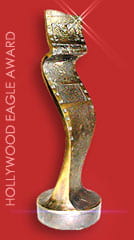 The 9th Polish Film Festival, a truly rewarding and unique “Holiday of Polish Cinema” in Los Angeles, will take place from April 24 through May 4, 2008. During the Gala Opening on the 24th of April at the DGA, there will be a screening of Lejdis by Tomasz Konecki, a film which had just its premier in Poland. A jury of prominent Hollywood filmmakers will present the Hollywood Eagle Award for best feature, documentary and animation and the Kodak Award for the best student etude. In addition, the Pola Negri Award will be presented for the first time at this year’s Gala Opening.
The 9th Polish Film Festival, a truly rewarding and unique “Holiday of Polish Cinema” in Los Angeles, will take place from April 24 through May 4, 2008. During the Gala Opening on the 24th of April at the DGA, there will be a screening of Lejdis by Tomasz Konecki, a film which had just its premier in Poland. A jury of prominent Hollywood filmmakers will present the Hollywood Eagle Award for best feature, documentary and animation and the Kodak Award for the best student etude. In addition, the Pola Negri Award will be presented for the first time at this year’s Gala Opening.
Amongst the films to be presented include Extras and Tomorrow We’re Going to the Movies by Michal Kwiecinski, God’s Little Garden by Jacek Bromski, Hope by Stanislaw Mucha, Immensity of Justice by Wielslaw Saniewski, Jasminum by Jan Jakub Kolski, Katyn by Andrzej Wajda, Preserve by Lukasz Palkowski, Savior Square by Krysztof & Joanna Krauze, Testersterone by Tomasz Konecki & Andrzej Saramanowicz, Time to Dieby Dorota Kedziersawska, Twists of Fate by Jerzy Stuhr, Expecting Love by Lukasz Karwowski, Forgiveness by Mariusz Kotowski and The Diving Bell and the Butterfly by Julian Schnabel with cinematography by Janusz Kaminski. The last three days of the Festival will be dedicated to Polish Television Theater and Polish Documentaries.
Special guests from Poland planning to attend the Festival include Agnieska Grochowska, Dorota Kedzierzawska, Tomasz Konecki, Tomasz Kot, Michal Kwiecinski, Lukasz Palkowski, Antoni Pawlicki, Krzysztof Pieczynski, Arthur Reinhart, Andrzej Saramanowicz, Witold Sobocinski, Danuta Stenka, Danuta Szaflarska and Artur Zmijewski. Also attending will be students from film schools in Katowice and Lodz.
Ed Harris has joined the Honorary Committee of the Festival, which already includes notable Academy Award winners such as Janusz Kaminski (Saving private Ryan, Schindler’s List, Amistad, Munich, Jurassic Park, Indiana Jones), Zbigniew Rybczynski (animator and director Tango), and Jan A.P. Kaczmarek (composer, Finding Neverland).
More information and sponsorship opportunities for this worthy cultural event are available at www.polishfilmla.org
Anderszewski In CA

Polish pianist Piotr Anderszewski is performing a short American tour with the Swedish Chamber Orchestra and their conductor Thomas Dausgaard. The tour will include two venues in California, as well as concerts in New York, Maryland, and Ohio. The California venues are listed below – other venues/dates are available at www.anderszewski.net/performances.
Saturday, 5 April 2008
Costa Mesa, CA
Orange County Performing Arts Centre – Segerstrom Hall
Repertoire: Beethoven – Piano Concerto No 1 in C major
Organiser: Philharmonic Society of Orange County
Sunday, 6 April 2008
Berkeley, CA
University of California – Berkeley
Repertoire: Beethoven – Piano Concerto No 1 in C major, op 15
Organiser: Cal Performances
Chopin Piano Competition
The Kosciuszko Foundation will hold the 59th Annual Chopin Piano Competition on Thursday through Saturday, April 3 – 5, 2008. Brilliant young pianists from across the country will compete, beginning at 10 a.m. on Thursday and Friday at the Foundation House, and at 2 p.m. on Saturday, in the Lang Recital Hall of Hunter College. Preliminaries are free and open to the public, but there is a $15 charge for Saturday’s finals. Reservations are highly recommended, as the Competition is extremely popular. For this year’s competition, David Dubal will chair the jury, which includes Mirian Conti and Jed Distler.
The Kosciuszko Foundation Chopin Piano Competition was established in 1949, on the one hundredth anniversary of the death of Fryderyk Chopin; the opening celebration took place at the Kosciuszko Foundation House, with Witold Malcuzynski as guest artist, and Abram Chasins, composer and music director of the New York Times radio stations, presiding over the special centennial program. Held annually since then, the competition is proud to number many outstanding pianists among its winners, including Van Cliburn, Murray Perahia, and Ian Hobson.
The objective of the Chopin Piano Competition is to encourage highly talented young musicians of all backgrounds, and to promote study and performance of the works of Chopin, Szymanowski, and other Polish composers. The competition is open to citizens or permanent residents of the United States, and international full time students, between the ages of 16 and 22.
Contestants prepare a program of approximately 70 minutes. The required repertoire includes works of Chopin and Szymanowski; Bach; a Classic sonata; a major 19th century work; and a work by an American, Polish-American, or Polish composer written within the last 50 years. Contestants perform from memory.
The first, second, and third prize winners are awarded scholarships in the amounts of $5,000, $2,500, and $1,500 respectively, and travel grants to New York if necessary. In addition to the financial scholarship, the first prize winner is offered additional concerts when possible.
The Jan Gorbaty Memorial Prize is given for the best performance of music of Chopin. Mr. Gorbaty was a beloved and respected teacher and performer, admired for his performance of Chopin’s works, and especially devoted to encouraging young musicians.
Baltic Piano Trio @ Kosciuszko Fdn
The Baltic Piano Trio makes its New York debut on Sunday, April 13 at 3 PM. Their program features the lush late Romantic Trio in G Minor, Op. 37, of Henryk Melcer (1869-1928); the bold Trio No. 1 (1934) of Andrzej Panufnik; the Piano Trio of Alicia Jonas, a Polish-born composer currently living and teaching New York; and closes with the Trio in D Minor of Gabriel Fauré.
Members of the Baltic Trio are all on the faculty of the Moniuszko Conservatory of Music in Gdańsk, Poland. Maciej Sobczak, violinist, has appeared as soloist, orchestral and chamber musician in Europe, Asia, and South America. He currently serves as Dean of the Department of Instrumental Music at the Conservatory. Jerzy Wujtewicz, cello, studied at conservatories in Kiev and Moscow, and has been on the Moniuszko Conservatory faculty since 1988. Bogumila Weretka-Bajdor, piano, studied at the same Moniuszko Conservatory, and has toured through Europe and the US.
Varsovia Piano Trio At Warsaw Phil
As a part of their “Musical Thursdays” series, the Warsaw National Philharmonic will present an all-Polish program on April 24, 2008 at 6:00 p.m. The program consists of Ludomir RÓŻYCKI – Rapsodia, Andrzej PANUFNIK – Trio, Bernard CHMIELARZ – Trio, Andrzej KURYLEWICZ – 2 Tanga. The concert will be performed by the Varsovia Piano Trio, whose members are: Ewa Skardowska-Killian – piano, Adam Zarzycki – violin, and Piotr Hausenplas – cello.
Awards
Duchnowski Honored In Vienna
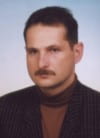 Polish composer Grzegorz Duchnowski was awarded the 2nd prize (the first prize was not awarded) at the International Composition Competition “Reinl-Preis 2008” in Vienna. The award was for his composition Akwarele [Watercolors] for alto saxophone, vibraphone, harp, piano and string quartet. The winning composition will be performed in Vienna on June 6, 2008.
Polish composer Grzegorz Duchnowski was awarded the 2nd prize (the first prize was not awarded) at the International Composition Competition “Reinl-Preis 2008” in Vienna. The award was for his composition Akwarele [Watercolors] for alto saxophone, vibraphone, harp, piano and string quartet. The winning composition will be performed in Vienna on June 6, 2008.
Grzegorz Duchnowski was born in 1971 and is a graduate of Łódź Music Academy where he studied with Sławomir Kaczorowski and Krzysztof Knittel. His compositions have already received considerable national and international recognition with several awards received and numerous festival performances.
Musica Sacra Competition Results
This year’s 4th International “Musica Sacra” Composition Competition attracted 48 composition submissions from Argentina, Australia, France, Grece, Spain, Iran, Canada, Korea, Germany, Norway, Poland, Portugal, Switzerland, USA and Italy. The jury consisted of Stephen Layton (Great Britain), Jan Łukaszewski (Poland), Volker Wangenheim (Germany), Paul Wingfield (Great Britain), and was led by chairman Marian Borkowski (Poland). They met in Gdańsk from February 29th until March 1st to make their decision. The co-organizer of the competition was the Polish chamber choir “Schola Cantorum Gedanensus.” The following awards were given:
 Grand Prix – not awarded
Grand Prix – not awarded
1st Prize – Izabela Adamskafor Parce Domine
2nd Prize – Dariusz Przybylski for … et desiderabunt mori…
3rd Prize – Rafał Janiak for Et in templo omnis lognetur gloriam
The awards ceremony will take place on May 3, 2008, during the 18th International “Gaude Mater” Festival of Sacred Music (May 1-6) in Częstochowa, Poland. The winners are given cash prizes, as well as a recording and performance opportunity at the Festival.
Kosciuszko Sembrich Competition Winners
Jacqueline Noparstak, soprano, won First Prize in the 2008 Sembrich Voice Scholarship Competition organized by the Kosciuszko Foundation in New York City. A native of Eugene, Oregon, Ms. Noparstak studied at Columbia University and now resides in New York City. She has appeared throughout the United States and won numerous competitions, most recently in the 2007 Liederkranz Foundation in New York. Ms. Noparstak received a $2,000 cash scholarship prize
Second Prize was awarded to bass Miroslaw Witkowski, a graduate of the Łódż Conservatory who is currently pursuing his Performer’s Diploma at Indiana University. He will receive a prize of $1,250. A Third Prize cash scholarship of $750 was awarded to baritone John Brancy, a first-year student at The Juilliard School, where he studies with Cynthia Hoffmann. The judges also presented a Special Mention to baritone Diego Matamoros, a graduate of the Yale School of Music.
Prizes were generously provided by the Marcella Sembrich Memorial Association, which also maintains the Sembrich Museum in Bolton Landing, New York, and Ms. Ann Coxe Zagoreos, herself a singer and for many years associated with the Sembrich Museum and with support for the arts. Jurors included Alfred Hubay, a long-time manager and administrator at the Metropolitan Opera, who also judges for the George London Foundation; Nedda Casei, of the Metropolitan Opera; and Elaine Malbin, of New York City Opera and San Francisco Opera.
Contestants were required to prepare a representative repertoire including songs and arias, selections by Moniuszko and contemporary American and Polish works. Auditions were held at Hunter College on Saturday, March 8.
The Competition honors Marcella Sembrich, the great Polish soprano who won an international reputation and established the voice faculties at both the Juilliard School and the Curtis Institute. Sembrich was not only a great artist but also a deeply loved teacher. Previous winners include Barbara Hendricks and Jan Opalach. Held every two years, the next Sembrich Voice Competition will take place in Spring 2010.
[from www.kosciuszkofoundation.org/News_sembrich08.html]
Teleman Competition Results
The 5th International Georg Philip Teleman Violin Competition took place between March 15 and 17 in Poznań. This competition was created specifically for young violinists. Those who participated this year could not have been born before December 31, 1991. The international jury consisted of Michał Grabarczyk (Poland, chairman), Bartosz Bryła (Poland), Antoni Cofalik (Poland), Sławomir Jarmołowicz (Poland), Tatiana Liberova (Russia), Wojciech Maliński (Poland), Wolfgang Marschner (Germany), František Novotny (Czech Republic), Eszter Perényi (Hungary) and Krystyna Majorowicz (Poland, secretary). The following awards were given:
- 1st Prize – Nazar Fediuk (Ukraine) – plus a special award for the best concerto performance
- 2nd Prize ex-aequo – Nikola Gajownik (Poland) – plus a special award for the best performance of G. F. Teleman’s Fantasia
- 2nd Prize ex-aequo – Balint Kristof Kruppa (Hungary)
- 3rd Prize ex-aequo – Aleksandra Juszczak (Poland)
- 3rd Prize ex-aequo – Aleksandra Machaj (Poland) – plus a special award for the best personality of the competition
- Honorary mentions went to: Roksana Kwaśnikowa (Poland) and Mateusz Michał Makuch (Poland).
For more information about the competition please visit www.telemann.art.pl.
Special Report From Poland
Ambassador Of Music
 The following is an interview between Gary Fitelberg, Polish-American relative of Polish conductor Grzegorz Fitelberg (pictured above), and journalist Dagmara Łopatowska, of Gazeta Wyborcza, Poland’s largest newspaper. (Translated from Polish by Daniel Kamiński)
The following is an interview between Gary Fitelberg, Polish-American relative of Polish conductor Grzegorz Fitelberg (pictured above), and journalist Dagmara Łopatowska, of Gazeta Wyborcza, Poland’s largest newspaper. (Translated from Polish by Daniel Kamiński)
One of the missions of my life is to preserve the output of Grzegorz Fitelberg. I also want to be an ambassador of Polish music in America and in the world – says Gary Fitelberg, a relative of the great conductor, who is visiting Poland.
Dagmara Łopatowska: You are related to Grzegorz Fitelberg through your father. What kind of relationship is it?
Gary Fitelberg: He was a cousin of my grandfather. My father’s name was George, so quite similar. His physical appearance was also very similar to Grzegorz Fitelberg, although he was the last to admit it. Their characters were also similar.
DŁ: Did your family stay in close relation to the conductor?
GF: During the war, when Grzegorz Fitelberg was in America, he performed frequently with Russian ballet companies. When he was conducting in the East Coast or Canada (my family settled in Canada), my father attended these concerts and met with Grzegorz. They also visited each other during the war and corresponded.
DŁ: Are they [the letters] still in the family?
GF: Unfortunately, the letters are missing. Some were lost during several relocations and others were destroyed by fire and water damage.
DŁ: So perhaps you have other memorabilia?
GF: We have several old LPs released by Muza and Decca with music of Grzegorz Fitelberg and Karol Szymanowski. We also have a few compositions, numerous photographs and letters from Grzegorz Fitelberg given to me by various people. Nothing else.
Until now, there was not much talk about Grzegorz Fitelberg. My interest in him started a few years ago. Right now I am the family genealogist. I studied journalism, I write about music. It is that much easier for me to study and write about this person. Fitelberg is a very important figure, both for Polish and international music history. I thought that it would be tragic and shameful if we did not take care of his output. I decided to do it. It became one of the missions in my life.
DŁ: How much were you able to achieve so far?
GF: First I started working on the genealogical tree. Afterwards I thought to extend my work and write a biography. I am still working on it. I have trouble with languages, and to read some of the materials you need to know French and Russian, also Polish. To access the contents of the museum collections you need permission. These are some of the obstacles,but I am not giving up.
I have another mission in my life. Grzegorz Fitelberg was called the “ambassador of Polish music” [and] I would like to follow in his steps, especially in America. We don’t know much about Polish music there. We know Chopin, maybe Paderewski, but not even Szymanowski. I try to slowly change the state of things, by organizing concerts of Polish music by older composers, like Grzegorz and Jerzy Fitelberg, Szymanowski, Karłowicz, Moniuszko or Noskowski and also younger and living composers such as Kilar, Górecki, Meyer, Krauze. I have connections with record publishers in America, Germany, and Great Britain. I try to promote Polish music by getting it recorded as well. I want to be an ambassador of Polish music in America and in the world.
DŁ: How often do you visit Poland?
GF: This is my first visit. I was planning on visiting Katowice for the previous edition of the Fitelberg competition but my father got sick and eventually died. That was unfortunate, since I really wanted to come.
DŁ: What did you think of the competition?
GF: I like the concert hall a lot, even though some complain about the acoustics. I also think that the orchestra of the [Silesian] Philharmonic is one of the best in the world – small, but powerful. I could see that the musicians were really trying to help the conductors, no matter how the conductors approached the orchestra. We have a group of conductors of the future here. This competition is very important on many levels. Fitelberg is currently a forgotten conductor. In his time he was as well-known as Prokofiev, Stravinsky or Artur Rubinstein. He toured the whole world but now nobody remembers him. The competition is an important event that helps to reestablish a memory of him and his compositions.
DŁ: Are you planning to return to Poland?
GF: This is definitely not my last visit. I might be back as soon as next month, because I am planning to make a short movie about Fitelberg – I want to collect some materials and talk to people who knew him.
DŁ: Where would you like to show it?
GF: The most suitable would be to show it at the next Fitelberg Conducting Competition in Katowice, and after that distribute copies to Polish music academies, like the Polish Music Center in Los Angeles and all the other musical institutions. It would be fantastic if I could show it at the Polish film festivals here, in Poland and also in America.
Beethoven Festival
by Gary Fitelberg
I am in the process of creating a documentary film project to document the legacy and life, honor the memory, and pay special tribute to my relative, the famous Polish composer and conductor GRZEGORZ FITELBERG. This film will be entitled “GRZEGORZ FITELBERG: Recollections & Reflections” and will feature the testimony of those individuals still alive today, over a half century after his death, who knew the maestro both personally and professionally, and most miraculously. Thus far, I have indentified approximately between 15-20 such important individuals, mostly in their eighties and nineties, active in mind and spirit who exhibit very colorful and creative personalities.
The film’s focus and goal is also to preserve the deep and rich cultural heritage and history of classical Polish music and to foster better dialogue in Polish-Jewish relations, as they share a common heritage which is inseparable in the past and future.
While on this tremendous, worthwhile journey I counted upon the advice and assistance of many individuals. One of the most impressive of individuals of all is Dr. Halina Szpilman, wife of the famous pianist Władysław Szpilman and remarkable in her own right, who has been at the forefront of advice, assistance and attentiveness in every conceivable way. First and foremost is her willingness to be one of the most important identifiable individuals to extend an interview. But if that were not enough alone, she has very courteously and graciously called others on my behalf and opened many doors, inviting me to concert performances with dignitaries and VIP’s, and inviting me to her home to share together special conversations, especially regarding the Szpilman legacy and stories of the past. My success will be especially due to her belief in me and my project. She is special woman, strong and sweet, and possessing charisma, great knowledge and a sense of humor – a down to earth and elegant lady who loves to laugh and shows a flair for the way to care. Mrs. Szpilman’s smile can melt one’s heart and you can feel her deep warmth immensely. I owe this very special lady a debt of gratitude.
 During my time in Poland, I was invited to two concerts of the XII Ludwig van Beethoven Easter Festival, organized by Elżbieta Penderecki together with Magdalena Sroka, Executive Manager, which took place March 20th and 21st. The first concert was under the Honorary Patronage of the Ambassador of the Federal Republic of Germany, Mr Michael Gerdts. Artists featured were Anke Vondung – mezzo-soprano, Marek Janowski – conductor, and the Radio-Symphonie-Orchester Berlin.
During my time in Poland, I was invited to two concerts of the XII Ludwig van Beethoven Easter Festival, organized by Elżbieta Penderecki together with Magdalena Sroka, Executive Manager, which took place March 20th and 21st. The first concert was under the Honorary Patronage of the Ambassador of the Federal Republic of Germany, Mr Michael Gerdts. Artists featured were Anke Vondung – mezzo-soprano, Marek Janowski – conductor, and the Radio-Symphonie-Orchester Berlin.
This was a special treat, especially the first concert, where I heard pieces by Gustav Mahler (1860-1911) and Anton Bruckner (1824-1896). The program included Mahler‘s Lieder eines fahrenden Gesellen—”Wenn mein Schatz Hochzeit macht”, “Ging heut’ morgens über’s Feld”, “Ich hab’ ein glühend Messer”, “Die zwei blauen Augen”— and Bruckner‘s Symphony No. 8 in C minor—I. Allegro moderato, II. Scherzo. Allegro moderato, III. Adagio. Feierlich langsam, IV. Finale. Feierlich, nicht schnell.
Featuring Mahler’s and Bruckner’s compositions together was a big hit with the audience members, who gave a standing ovation that seemed to last forever, and perhaps even an eternity. The full capacity crowd and music lovers could not get enough of these superbly talented musicians.
From my point of view in the second-tier balcony, I had a clear view of the conductor and his very expressive gestures as well as the very sheet music, where the notes on the page were within my grasp. One could not have had a better seat in this beautiful, elegant, and exquisite concert hall. I also had a private meeting with the conductor after the performance.
I met many people including members of the artistic, cultural, musical elite, both from Poland and worldwide. Amongst them were conductors, composers, musicians, and organizers. The long list of names is much too numerous to mention all of them.
Most friendly were the current President of Poland and his wife, the wife of Poland’s former president, the wife of composer Krystof Penderecki, as well as many other celebrities, dignitaries and VIP’s. This virtual “Who’s Who” list included such wonderful personalities as composer Wladozmierz Kotoński, conductors Bogdan Oledzki and Andrzej Sułek, musicologist Elżbieta Markowska, pianist Pawel Kowalski, Director Grzegorz Michalski of the Fryderyk Chopin Institute, and violinist Henryka Tronek, to name but a few.
I was extended a warm welcome by all of these important people and it made my visit to Warsaw very comfortable and pleasant. It was a most welcome surprise and one that shall never be forgotten.
One could go on and on all day about such a trip. My suggestion is to encourage all to go in person to hear a worldwide selection of concerts consisting of the international classical music scene’s greatest composers, conductors, orchestras and ensembles, or at the very least to the website of this amazing music festival—www.beethoven.org.pl—which is one of Poland’s greatest sources of pride.
Popular Music Scene In Poland
by Gary Fitelberg
The Polish Music Center at USC primarily focuses on the genre of classical music, but Polish musicians play an important role in the jazz, punk, pop, heavy metal, blues, reggae, and hip hop scenes as well. These should not be forgotten or neglected, as Polish music offers many spices for varied tastes.
Robotnik was established in July 1988 in Wrocław. Their music is a combination of contemporary music inspired by electronics and the energy of jazz improvisation. As a part of their repertoire there is no place for solo actions of the selected instruments, however none of them dominate the others. The band has already recorded three albums: Jogging (2000), Instytut las (2003) and Nawki Przyrody (2004). Robotnik has given concerts in Poland for five years.
Abradab (a.k.a Marcin Marten) is one of the founders and pillars of the Kaliber 44 band. He debuted as a solo performer on Alchemy (2003), an album by Hgor (IGS). His Red Album (2004) was an excellent combination of reggae and hip-hop. Abradab is supported by Joka from Kaliber 44 and Gutek, a reggae vocalist. In 2005, Abradab released his next album, Emission of fumes. It is important to mention that Kaliber 44 is one of the first and most important bands in the history of Polish hip-hop.
Festivals
Poznań Music Spring
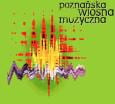 The 39th edition of the Polish Contemporary Music Festival “Poznań Music Spring” will take place in Poznań between April 6 and 13, 2008. During the festival there will be several premiere performances of works by Dariusz Przybylski, Mirosław Bukowski, Zbigniew Bujarski, Grażyna Pstrokońska-Nawratil and Artur Kroschel. Also in the program: Mauricio Kagel, Alban Berg, Arnold Schoenberg, Anton Webern, Roman Maciejewski (Requiem), Paweł Szymański (Dwie Etiudy), Henryk Mikołaj Górecki (3rd String Quartet), Krzysztof Penderecki (Przebudzenie Jakuba) and Witold Lutosławski (4th Symphony). The festival will conclude with performances of three concertos by Jan Astriab, Marek Stachowski and Henryk Mikołaj Górecki.
The 39th edition of the Polish Contemporary Music Festival “Poznań Music Spring” will take place in Poznań between April 6 and 13, 2008. During the festival there will be several premiere performances of works by Dariusz Przybylski, Mirosław Bukowski, Zbigniew Bujarski, Grażyna Pstrokońska-Nawratil and Artur Kroschel. Also in the program: Mauricio Kagel, Alban Berg, Arnold Schoenberg, Anton Webern, Roman Maciejewski (Requiem), Paweł Szymański (Dwie Etiudy), Henryk Mikołaj Górecki (3rd String Quartet), Krzysztof Penderecki (Przebudzenie Jakuba) and Witold Lutosławski (4th Symphony). The festival will conclude with performances of three concertos by Jan Astriab, Marek Stachowski and Henryk Mikołaj Górecki.
The festival is organized by Poznań chapter of the Polish Composers Union [ZKP] and the Poznań Tadeusz Szeligowski Philharmonic. The artistic concept for this festival was created by composer Krzysztof Meyer. Maciej Jabłoński is the director of the festival. An unofficial program of the Festival is available here: www.kamertonet.republika.pl/pwm_08prog.html
Polish Radio Folk Festival
 The 11th edition of the “New Tradition” Festival, organized by Polish Radio, will take place between April 10 and 13 in the Witold Lutosławski Concert Studio of the Polish Radio studios. Among the invited guests are: Dona Rosa (fado singer, Portugal), Andrew Cronshaw, Jean Michel Villon and brother Molard, and the Karpatia ensemble, winners of last year’s edition.
The 11th edition of the “New Tradition” Festival, organized by Polish Radio, will take place between April 10 and 13 in the Witold Lutosławski Concert Studio of the Polish Radio studios. Among the invited guests are: Dona Rosa (fado singer, Portugal), Andrew Cronshaw, Jean Michel Villon and brother Molard, and the Karpatia ensemble, winners of last year’s edition.
The competition part of the festival requires the participants to draw inspiration from Polish or Polish-based folk traditions. During the festival the award for The Best Record of the Year 2007 will be given. For more information about the program of the festival please visit polskieradio.pl/koncerty
Śląsk Jazz Festival
 The Śląsk Jazz Festival is a special musical event in the Silesian region. The festival, in its 3rd edition this year, is organized by the Jazz Department of the Katowice Music Academy. Between April 1 and 4 there will be daily concerts, music workshops and master-classes in the classrooms of the Music Academy, as well as nightly jam sessions in Katowice’s finest jazz clubs.
The Śląsk Jazz Festival is a special musical event in the Silesian region. The festival, in its 3rd edition this year, is organized by the Jazz Department of the Katowice Music Academy. Between April 1 and 4 there will be daily concerts, music workshops and master-classes in the classrooms of the Music Academy, as well as nightly jam sessions in Katowice’s finest jazz clubs.
Invited guests include several stars from the US East coast jazz scene, as well as numerous great Polish jazz players. Some of the names include: the Sim Faculty Band (Ralph Alessi – trumpet, Ravi Coltrane – saxophone, Mark Helias – double bass/el. bass, Brad Shepik -guitar, Jim Black – drums, Matt Mitchell – piano), Ed Partyka, Judy Brady, Wallace Roney, and Christopher Titz. For more information about the program of the festival please visit www.am.katowice.pl/Inne/slaski_festiwal_jazzowy_2008.html.
Discography
Chopin By Świtała
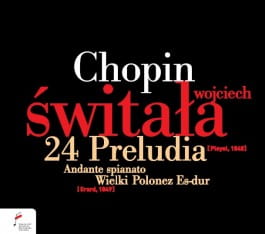 Wojciech Świtała – Chopin: 24 Preludes
Wojciech Świtała – Chopin: 24 Preludes
Frederic Chopin: 24 preludes, Andante Spianato, Grand Polonaise in E flat Major
Wojciech Świtała, piano
NIFC
This disc is a continuation of a series of recordings of Chopin’s music on the period instruments. The National Frederic Chopin Institute is dedicated to releasing complete recordings of Chopin’s music played in this way. The Preludes were recorded on 1848 Pleyel grand piano and the other two compositions on 1849 Erard.
Wojciech Świtała is a laureate of numerous national and international competitions, including the 12th International Chopin Piano Competition in 1990, where he received a special award for the best performance of a polonaise. This CD and others from the series are available from the National Frederic Chopin Institute website.
Szymański Once More
 Szymański
Szymański
Paweł Szymański: Complete recordings from the Paweł Szymański Music Festival 2006
Various Artists
PWA
This release contains virtually the complete recording of the concerts of the Paweł Szymański Music Festival. This Festival was organized by Polish Audio-Visual Editions in the Lutosławski concert studio of the Polish Radio in 2006. The first disc of this four-disc release contains a thirty minute monologue given by Paweł Szymański, which was provoked by Mariusz Grzegorzka.
New from DUX
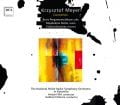 Meyer: Concertos
Meyer: Concertos
Krzysztof Meyer: Concerto for cello and orchestra no. 2 op. 85; Concerto for violin and orchestra no. 2 op. 87; Concerto for clarinet and orchestra op. 96
Eduard Brunnel – clarinet, Gabriel Chmura – conductor, Polish Radio National Symphony Orchestra in Katowice , Boris Pergamenschikow – cello, Magdalena Rezler – violin, Antoni Wit – conductor
DUX 0594
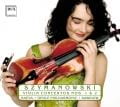 Szymanowski violin concertos nos. 1 & 2
Szymanowski violin concertos nos. 1 & 2
Karol Szymanowski: Violin Concerto no. 1 op. 35; Violin Concerto no. 2 op. 61
Alena Baeva – violin, Bogusław Dawidow – conductor, Opole Philharmonic
DUX 0575
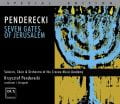 Krzysztof Penderecki: Seven Gates of Jerusalem
Krzysztof Penderecki: Seven Gates of Jerusalem
Krzysztof Penderecki: Seven Gates of Jerusalem for five solo voices, narrator, three mixed choirs and orchestra
Kraków Music Academy Choir , Paweł Fundament – tenor, Maria Lenart – alto, Anastazja Lipert – soprano, Izabela Matuła – soprano, Marta Olga Mularczyk – soprano, Kraków Music Academy Symphony Orchestra, Krzysztof Penderecki – conductor, Leszek Solarski – bass, Anna Stolarczyk – soprano, Jerzy Trela – narrator
DUX 0546
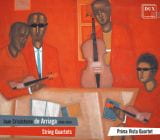 Juan Crisóstomo de Arriaga. String Quartets
Juan Crisóstomo de Arriaga. String Quartets
Juan Crisóstomo de Arriaga: String Quartets nos. 1, 2 & 3
Prima Vista String Quartet: Krzysztof Bzówka – violin I, Józef Kolinek – violin II, Dariusz Kisieliński – viola, Jerzy Muranty – cello
DUX 0577
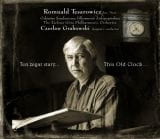 Ten zegar stary [This old clock]
Ten zegar stary [This old clock]
Songs my Moniuszko, Mussorgski, Szeligowski, Borodin, Żeleński, Dvorak and Tchaikovsky
Czesław Grabowski – conductor, Zielonogórskie Philharmonic, Romuald Tesarowicz – bass
DUX 0624
Penderecki On Naxos
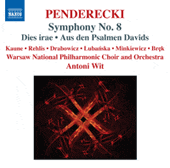 PENDERECKI: Symphony No. 8 / Dies irae / Aus den Psalmen Davids
PENDERECKI: Symphony No. 8 / Dies irae / Aus den Psalmen Davids
Brek, Jaroslaw; Drabowicz, Wojtek; Kaune, Michaela; Lubanska, Anna; Minkiewicz, Ryszard; Rehlis, Agnieszka; and the Warsaw National Philharmonic Orchestra & Choir, Antoni Wit – conductor
Naxos 8.570450
Below are excerpts from a 4-star review of this disc by Peter Bates of Audiophile Audition, February 2008.
[Krzysztof Penderecki] bases his text on several different poets: the nature-worshiping Joseph von Eichendorff, the angelic Rainer Maria Rilke, the misanthropic Karl Kraus, the alienated Hermann Hesse, the redoubtable Johann Wolfgang von Goethe, and the arch-romantic Achim von Arnim. These poets have displayed mystical or pantheistic strains in their poetry from time to time, which may explain Penderecki’s attraction to them. Musically, the Symphony No. 8 holds together as a post-romantic work, a shotgun marriage between Gustav Mahler and Dimitry Shostakovich… Penderecki’s music is intense here, yet less mannered and shocking than his earlier choral works… Rounding off this disc is a fine performance of the composer’s modernistic Dies irae (a tribute to the victims of fascism)… The earliest piece, Aus den Psalmen Davids, is a nine minute choral work with striking rhythms and a reverential—and emphatic—supplication as finale…
Anderszewski Plays Beethoven
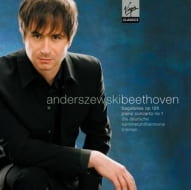 Beethoven: Piano Concerto in C major, op. 15 & Six Bagatelles, op. 126
Beethoven: Piano Concerto in C major, op. 15 & Six Bagatelles, op. 126
Piotr Anderszewski – piano & conductor, with the Deutsche Kammerphilharmonie Bremen
EMI/Virgin Classics 50999 502111 2 8
Polish pianist Piotr Anderszewski’s latest CD features the Piano Concerto in C major op. 15 and the six Bagatelles op. 126 of Beethoven. The disc was released by Virgin Classics in Europe on 24 March 2008. Anderszewski’s partners in the concerto are Die Kammerphilharmonie Bremen, whom he directs from the keyboard.
This disc presents early and late Beethoven back to back. The concerto was composed in 1795 when Beethoven was a young virtuoso performer of his own music. By contrast, the Bagatelles (1823-24) anticipate the ultra-lucid world of the late quartets. Watch a promotional video of the making of this album here: www.emimusic.ch/video/79057#1.
Tansman On Chandos & Naxos
 Alexandre Tansman : Symphonies – Volume 2
Alexandre Tansman : Symphonies – Volume 2
Tansman: Symphony No. 7 “lyrique”; “Musique pour orchestra” (Symphony No. 8); and Symphony No. 9 (world premiere recording)
Melbourne Symphony Orchestra, Oleg Caetani – conductor
SACD Chandos 5054
 Alexandre Tansman : Chamber music with clarinet
Alexandre Tansman : Chamber music with clarinet
Tansman : Music for Clarinet and String Quartet; Musique à six; 3 Pieces for Clarinet, Harp and String Quartet; and Triptyque for string quartet
Jean-Marc Fessard – Clarinet and bass clarinet; Eliane Reyes – Piano; Francis Pierre – Harp ; and the Elysée Quartet
CD Naxos 8.570235
Anniversaries
Born This Month
- 1 April 1872 – Tadeusz JOTEYKO, composer (d. 20 August 1932)
- 3 April 1904 – Maria WILKOMIRSKA, pianist professor of piano in Lodz and Warsaw
- 4 April 1941 – Aleksander GLINKOWSKI, composer active in Katowice (d. 1991)
- 8 April 1890 – Zbigniew DRZEWIECKI, pianist and professor of piano, organizer of Chopin Competitions, president of Chopin Society
- 9 April 1880 – Stanislaw LIPSKI, pianist and composer (d. 6 October 1937)
- 9 April 1951 – Andrzej KRZANOWSKI, composer (d. 1990)
- 13 April 1890 – Ludwik BRONARSKI, musicologist (d. 1975)
- 18 April 1903 – Tadeusz KWIECINSKI, composer (d. 11 July 1960)
- 21 April 1907 – Antoni SZALOWSKI, composer (d. 21 March 1973)
- 29 April 1880 – Adolf CHYBIŃSKI, musicologist, professor of universities in Lwów and Pozńan (d. 31 October 1952)
Died This Month
- 5 April 1935 – Emil MLYNARSKI, conductor, violinist, composer, music director of the Warsaw Opera, (b. 18 August 1870)
- 6 April 2006 – Augustyn BLOCH, composer and organist, vice-President of ZKP [Polish Composesrs’ Union] from 1983-1987 (b. 13 August 1929)
- 9 April 1944 – Boleslaw WALLEK-WALEWSKI, conductor and composer, active in Krakow, Warsaw and Pozńan (b. 23 January 1885)
- 11 April 1938 – Bronislawa WÓJCIK-KEUPRULIAN, musicologist, professor of Lwów University, specialist in Chopin and Armenian music (b. 6 August 1890)
- 12 April 1956 – Tadeusz STRUMILLO, musicologist, professor of Jagiellonian University, with Z. Szweykowski discovered over 200 compositions of 18th, 19th c. (b. 10 July 1929)
- 13 April 2007 – Andrzej KURYLEWICZ, composer and conductor, best known for jazz but also wrote classical works and music for film, TV, and theather (b. 24 Nov 1932)
- 15 April 1945 – Feliks WRÓBEL, composer and music theorist (b. 15 May 1894)
- 18 April 1854 – Józef ELSNER, composer, founder of Warsaw Conservatory, teacher of Chopin (b. 1 June 1769)
- 18 April 2006 – Maria DZIEWULSKA, composer, music theoretician and dedicated educator (b. 1 June 1909)
- 24 April 1845 – Anna WOLKOW-STANIUKIEWICZ, soprano, singer of Warsaw Opera (b. 26 August 1808)
- 25 April 1951 – Jerzy FITELBERG, composer, son of conductor Grzegorz, since 1933 lived in Paris, 1940 in New York (b. 20 May 1903)
- 28 April 1928 – Henryk MELCER-SZCZAWINSKI, pianist, teacher, conductor, professor and chair of the Warsaw Conservatory of Music (b. 21 September 1869)
